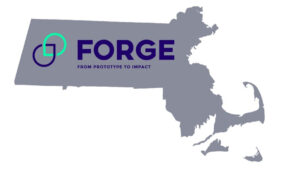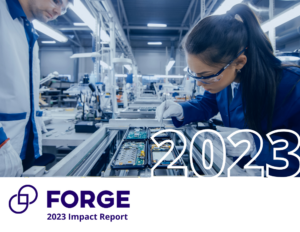Startup Perspectives: Why You Should Manufacture Locally
At FORGE, we believe in the value of supporting innovation, stimulating the local economy, and connecting the vast networks of creators and manufacturers in Massachusetts and New England. The state of Massachusetts itself, where FORGE maintains its offices, has the largest concentration of people employed in the innovation ecosystem in the country, with roughly 38% of employees in the state working in the innovation economy in some way (Source: WBUR.org). At the same time, there are over 6,000 manufacturers in the state, and many of these are ready and willing to work with new innovators (Source: National Association of Manufacturers). Historically, there have been challenges in bridging the gap between these two capable local groups – and that’s where FORGE comes in.
To better understand the incentives for startups to localize their supply chain, we spoke with Seth Maciejowski and Bryan Gordon, both from innovative companies that are making great strides in the energy sector and doing it with the help of regional suppliers.
Packetized Energy and Ivys Energy Solutions, Inc. both maintain a location in Somerville, MA, co-located with FORGE Headquarters at Greentown Labs. Packetized makes electricity flexible with software for the electricity industry so distributed energy can be clean, affordable, and easy to use. Ivys is developing innovative technologies and products to make a fundamental impact on automotive hydrogen refueling infrastructure, enabling the successful near-term rollout of fuel cell vehicles.
Both of these innovative companies have worked with FORGE to find regional partners as vendors and contract manufacturers, and have shared their perspectives on unique competitive advantages through product development process streamlining, geographic incentives, and economic incentives.
Streamlining the Product Development Process
“Don’t design in a vacuum,” is Bryan Gordon’s biggest piece of advice to new startups. As the Principal Engineer for Ivys Energy Solutions, Inc., he has seen firsthand the importance of working with local contract manufacturers and vendors, particularly in the product development process. He advises that smaller partners are more agile and tolerant to the rapid design cycles that new startups face, and are more capable of working with engineers on the fly. In a small company where every day matters, regional manufacturers can use their experience as an integrator to provide critical design input early on, helping make your product easier to build.
One of the more unexpected and underutilized aspects of working closely with regional contract manufacturers is not only access to their facilities, but to their networks as well. Larger contract manufacturers and distributors have vast product lines, and may have new hardware solutions that are a better fit for your prototype. As Gordon put it, “startups often don’t think about what they need, and instead fixate on what they can get.” By leveraging your distributors’ expertise and experience, you can find solutions and components for your product that you never knew existed.
Geographical Advantage
Seth Maciejowski, Director of Energy IoT for Packetized Energy, is an advocate for prototyping close to home: “time is the most critical element, so in the prototype phase if you can turn something super fast, that’s a huge advantage.” By reducing material and product lead times, you can bring your innovation to market faster. Your company also gets the unique opportunity of having a front-row seat to see your first product come off of the assembly line.
Manufacturing domestically can confer advantages in the form of quality, intellectual property protections, and even just being able to say that your product was “Made in America.” This was a major selling point for Ivys when they were competing for a contract with the Champaign-Urbana Mass Transit District in Illinois, a project that required a percentage of all hardware to be made or assembled stateside. Ivys ultimately won the contract, attributing much of their success to being able to meet the “Made in America” standard. This is a rising trend, especially with the Biden Administration’s Executive Order to establish domestic preference requirements to stimulate American industry. This order promises to “Build Back Better” following the collapse of global supply chains from the COVID-19 crisis (Source: White House).
For innovators that are impact-oriented, proximity to your manufacturers offers benefits in the form of a reduced carbon footprint. Manufacturing contributes to roughly 20% of worldwide emissions, and much of this can be tied to global shipping of materials and components (Source: World Bank). Reducing industry footprint is essential to carbon reduction goals, and localizing supply chains is an important piece of the puzzle.
Economic Advantage
A common assumption is that outsourcing your company’s manufacturing is the cheapest option available. This often fails to account for the additional costs associated with unexpected tariffs, shipping fees, delays, and management overhead from working overseas, after which the savings from low production costs can be all but lost. These factors are especially relevant in the wake of recent supply chain disruptions caused by COVID-19 and the blocking of the Suez Canal.
For the engineering team at Packetized Energy, there is an emphasis on local manufacturing for low volumes. “It’s going to make more sense to work closely with local vendors on a smaller volume product from the get-go because you can prototype faster and they’ll be more familiar with your product as you scale up,” Seth Maciejowski explains. Price sensitivity increases with volume at Packetized Energy and Ivys, but they maintain strong relationships with their local integrators and suppliers to build a good rapport. With this type of bond established, they can hold difficult conversations about growth and scaling, and they often continue using local suppliers for smaller volumes, product development, and referrals for new suppliers even as they scale aspects of their manufacturing offshore. FORGE has a startup-first mentality and believes strongly in manufacturing locally when it makes sense for your needs.
There are many manufacturers across Massachusetts, New England, and the U.S. ready to support innovators, but there is a noticeable divide between the gateway and working cities where manufacturers are clustered, and the innovation hubs in cities. FORGE works to bridge this gap, making right-fit connections that support both the innovators and the local economy.
According to Gordon, one of Ivys’ biggest motivations for localizing their manufacturing was to reinvest in the community. They have worked with smaller contract manufacturers to build out their capabilities to not only serve Ivys’ specific needs, but to add to their vendors’ offerable services. “We are setting up our vendors to be successful and use the skill sets they learned to grow the local area as a hub,” Gordon explains. This effect cascades, as these contract manufacturers continue to source material from other local vendors and provide services to nearby startups, resulting in a new hub of innovation and industry.
Taking the First Step
Despite common misconceptions, local manufacturing presents incredible opportunities for startups through product development assistance, being “Made in America”, and establishing long-term, mutually beneficial partnerships.
Parting advice from Gordon for startups just beginning their manufacturing journey: “Shop around. Don’t go to one contract manufacturer and settle for the lowest bidder. Startups often try to get their costs down right away, but going to the lowest bidder sometimes backfires. They may not have the ability to grow with you or they may not have the quality you need for your product.” The good news: FORGE is here to make right-fit local introductions for your startup’s supply chain needs, removing guesswork and ensuring a speedy response from confirmed startup-friendly manufacturers.
Since 2015, FORGE has been dedicated to preparing innovators to work with manufacturers and making right-fit connections to the regional supply chain expertise and resources. FORGE has made over 1,500 connections between startups and regional suppliers that have resulted in over $30 million known contracts and purchase orders to make innovative products locally. If you’re a startup with a physical prototype looking to get connected to the supply chain, sign up for a Product Development Session! This will be an opportunity to have a call to discuss any of your prototyping or manufacturing needs and get connected to the professionals that can help.
Want to learn more about our connections and previous companies we’ve worked with? Check out our Startup Success Stories!
Looking for supplier expertise on common product development and manufacturing challenges? Check out our Tools of the Trade!






